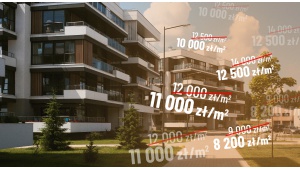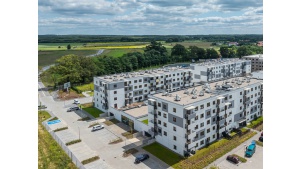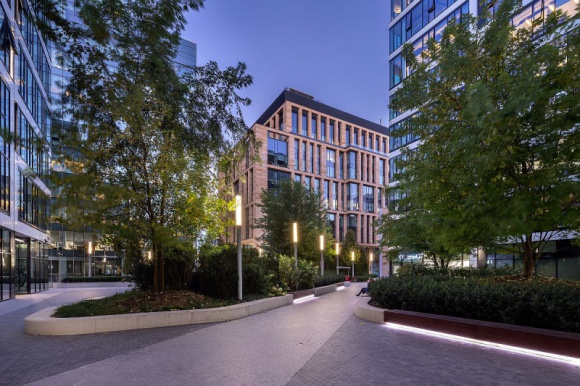New tenants and agreement extensions in Gdański Business Center
- In recent months, lease agreements for a total area of 8,400 sqm. have been signed in Gdański Business Center.
- The office complex with the area of 101,000 sqm. located in Warsaw and being part of Savills Investment Management’s portfolio, is fully leased.
Extensions of current lease agreements, expansions and new agreements – owing to these transactions with a total area of 8,400 sqm., the entire commercial space in Gdański Business Center remains fully leased. This Warsaw office complex has strengthened its cooperation with Polish and international companies whose headquarters have been located in Gdański Business Center for several years now; among others, Dell Technologies, Webinterpret Poland, Solid Logistics or Coloplast. On the other hand, Medicover and RSM Poland have become new tenants of the complex managed by Savills Investment Management.
The largest lease agreement in Gdański Business Center over the last few months has been a long-term agreement for approx. 3,000 sqm. concluded with one of the global leaders in the technology market, Dell Technologies. It covers the extension of the lease period relating to the currently leased space and expansion of the company within the complex. Another regular tenant, Webinterpret Poland, a company specialising in modern e-Commerce solutions, has extended its current lease agreement for another 5 years. Tenants who have decided to stay longer in Gdański Business Center include Coloplast (approx. 930 sqm.), Solid Logistics (approx. 620 sqm.), Rentals United (approx. 380 sqm.) and Tiger of Sweden (approx. 300 sqm.).
At the end of 2019, the group of tenants was joined by two new companies in the complex. RSM Poland, a company specialising in tax advisory, financial audits and accounting, decided to lease almost 1,000 sqm. of space on the 3rd floor of building B of Gdański Business Center. In turn, Medicover clinic providing the highest quality dental services occupies 250 sqm. on the ground floor of the same building.
Julia Racewicz, Senior Asset Manager, Savills Investment Management, said:
“We are very pleased with the decisions of our tenants to stay in Gdański Business Center, as well as with the new lease agreements, which proves the strong position of the complex in the extremely demanding and competitive Warsaw office market. It is our great satisfaction that our activities are appreciated by dynamically developing companies and leaders in their industries. It is even more satisfying because as the asset manager of this investment, every day, we make every effort to ensure that the high quality of the Gdański Business Center space, combined with professional management, creates a friendly, comfortable and attractive working environment for all companies that decided to move their headquarters here. We are available to our tenants every day. We create this complex with them.”
Gdański Business Center is a modern complex of four A-class office buildings, located in Warsaw’s Muranów district. The project offering 101,000 sqm. of commercial space was developed between 2014 (phase I) and 2016 (phase II). Currently, about 10,000 people work in the whole office complex, and its key tenants include KPMG, Aviva, Philip Morris, KMD, Uber, Nielsen and Dell Technologies.
Apart from the office space, Gdański Business Center also features restaurants, cafes, beauty salons, a kindergarten, medical centre, Zdrofit fitness club and public courtyard with greenery and structural landscaping. The tenants of the complex may also use terraces located on the upper floors of the buildings. The underground storeys of the investment have in turn been designed as a garage offering 1,379 underground parking spaces and 76 above-ground parking spaces as well as infrastructure for cyclists with 416 bicycle racks, changing rooms and showers.
Gdański Business Center is located right next to the Dworzec Gdański subway station and Warszawa Dworzec Gdański railway station. Near the complex there are also several bus and tram stops and city bike rental points, which guarantees excellent transport opportunities to other districts of Warsaw.
Awarded a BREEAM Excellent environmental certificate, the investment was purchased by Savills Investment Management on behalf of a global pension fund.

Deweloperzy ukrywają ceny mieszkań. Z troski o klientów czy swoje portfele?

Więcej przestrzeni, mniej hałasu – dlaczego Polacy coraz częściej wybierają przedmieścia?

Jak czytać rzuty mieszkań i uniknąć przykrych niespodzianek? AI ułatwia wybór
Więcej ważnych informacji
 Jedynka Newserii
Jedynka Newserii

 Jedynka Newserii
Jedynka Newserii

Konsument

Proces deregulacji nie dotyczy branży tytoniowej. Jest propozycja kolejnej ustawy w ciągu kilku miesięcy
Najpierw wprowadzenie podatku akcyzowego na saszetki nikotynowe, potem propozycja przepisów, które zmierzają do wycofania tych produktów z rynku – przedstawiciele środowisk biznesowych podkreślają, że przygotowywane przez resort zdrowia przepisy wprowadzają chaos legislacyjny w branży tytoniowej. To tym bardziej dziwi przedsiębiorców, że stoi w opozycji do prowadzonego przez rząd procesu deregulacji w gospodarce. W dodatku może mieć negatywne skutki dla budżetu państwa i doprowadzić do skokowego wzrostu szarej strefy.
Bankowość
Grzyby rozkładające tekstylia nagrodzone w konkursie ING. 1 mln zł trafi na innowacyjne projekty dla zrównoważonych miast

Firma Myco Renew, która opracowała technologię rozkładającą tekstylia za pomocą grzybów, została laureatem siódmej edycji Programu Grantowego ING. Motywem przewodnim konkursu skierowanego do start-upów i młodych naukowców był tym razem zrównoważony rozwój miast i społeczności. Łącznie na nagrodzone innowacyjne projekty trafił 1 mln zł. Wśród nich są także bezzałogowe statki powietrzne dostarczające defibrylatory czy system do zbierania deszczówki w blokach.
Prawo
Trwają próby wzmocnienia dialogu społecznego. Niespokojne czasy wymuszają większe zaangażowanie społeczeństwa w podejmowanie decyzji

Według zapowiedzi szefowej Komisji Europejskiej Ursuli von der Leyen głos partnerów społecznych i dialog społeczny będą stały w centrum procesu decyzyjnego w Europie. Taki jest cel podpisanego w marcu Paktu na rzecz europejskiego dialogu społecznego. Potrzeba wzmocnienia głosu społeczeństwa jest również podkreślana na forum krajowym. Rząd planuje reformę Rady Dialogu Społecznego, by usprawnić pracę tej instytucji, a przedsiębiorcy wzywają do rzetelnego konsultowania ze stroną społeczną ustaw, które wychodzą z rządu.
Partner serwisu
Szkolenia

Akademia Newserii
Akademia Newserii to projekt, w ramach którego najlepsi polscy dziennikarze biznesowi, giełdowi oraz lifestylowi, a także szkoleniowcy z wieloletnim doświadczeniem dzielą się swoją wiedzą nt. pracy z mediami.








.gif)

 |
| |
| |
|